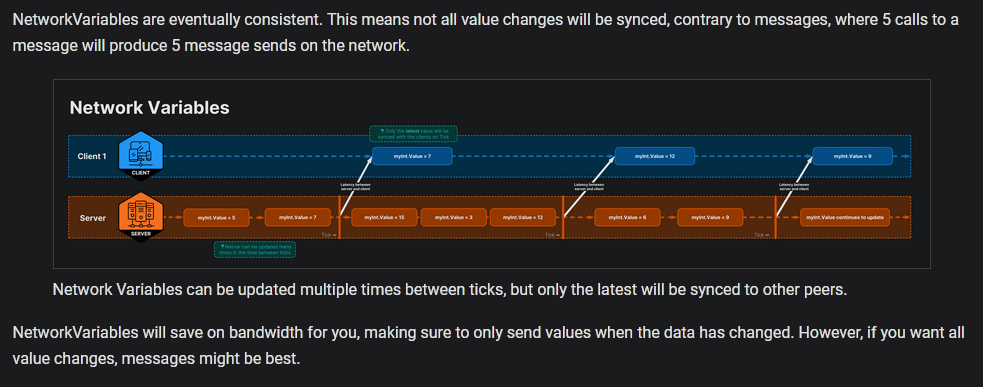Network Variable Usage
Network Variables sync data between the server and all clients.
They automatically sync when joining the server, and thus are great for consistent information.
Creating the Variable
There are two ways to make a new network variable, through the constructor or through a helper extension method.
Using the constructor will create a server-owned variable, or if marked, a publicly-owned variable. On the other hand, using one of the helper methods, a client-owned network variable - owned by the client owning the object/behaviour.
To make a new network variable, there are two pieces of information required: the identifier and the type of the variable.
TData is the data type of the message, which can be any serializable type - practically any type. Examples of serializable types are:
stringintVector3Color
NOTE
This identifier will be shared between all instances of network variables in the mod.
Any other mods with the same identifier or any messages or events of the same identifier will not interact with your variable.
Constructor
Using the constructor is simple:
public static LethalNetworkVariable<TData> customVariable = new LethalNetworkVariable<TData>(identifier: "customIdentifier");If you want to set a value to the network variable while initializing it, you can use object initializers:
public static LethalNetworkVariable<string> customString = new LethalNetworkVariable<string>("customString") { Value = "Hello, World!" };Helper Method
You can use .GetNetworkVariable<T>(identifier) on any Network Object or Network Behaviour. This will create a new network variable owned by that object, or get the network variable if it already exists.
ForestGiantAI instance;
LethalNetworkVariable<string> customString = instance.GetNetworkVariable<string>("customString");Using this method, variable values will only sync if the host client has created an instance of the variable by using the method as well.
TIP
If you specify serverOwned = true in the helper parameters, it'll define the variable as a server-owned variable and will only be available to be written to by the server.
The [PublicNetworkVariable] is not applicable to the helper method.
Ownership
As mentioned earlier, variables made with the constructor can be made public. It's as simple as adding the [PublicNetworkVariable] attribute to the field.
[PublicNetworkVariable]
public static LethalNetworkVariable<TData> customVariable = new LethalNetworkVariable<TData>(identifier: "customIdentifier");Doing so will allow any client to modify the variable.
Getting/Setting the Value
Because the variable is a class and not a type, to get or set the value, you must use .Value.
The following code prints the value of a LethalNetworkVariable of type string:
Plugin.Logger.LogDebug(customString.Value);To set the value, it's as simple as setting a normal variable (additionally with .Value);
customString.Value = "Hasta la vista, baby!";Event/Delegate
There is a OnValueChanged event that runs when the value is changed. The following cases are when it is invoked:
- When setting the variable
- When joining a lobby/game1
- When creating a variable during playtime (in the lobby)1
- When a variable is updated over the network
- This only happens every Network Tick; the following is taken (and adjusted) from Unity's NGO docs.

The OnValueChanged event is invoked with the parameter TData data, where TData is the type specified in the constructor.
customString.OnValueChanged += NewValue;
private void NewValue(string newValue)
{
//...
}1: These will only happen if the network variable of the same identifier exists on the server/host (if the variable is initialized on the server/host).